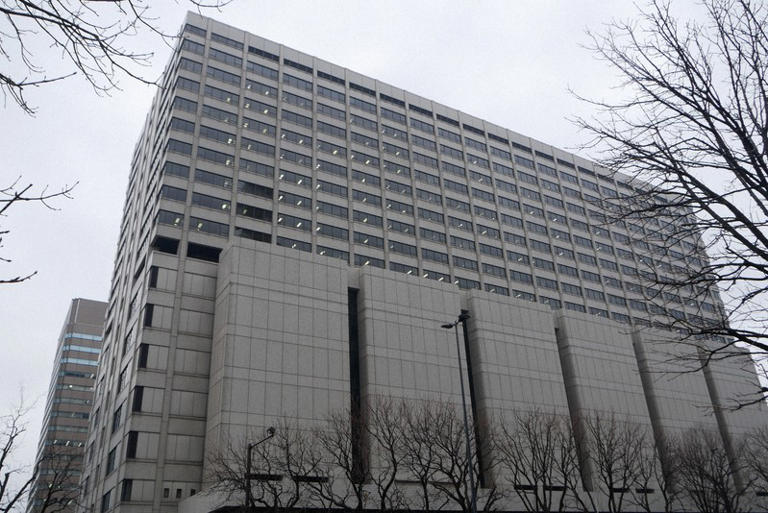TOKYO — The Tokyo District Court on July 24 ordered the Japanese government to pay approximately 5.5 million yen (about $38,800) in damages to an Iranian man who filed a lawsuit claiming that the immigration bureau’s refusal to renew his status of residence was illegal.
According to the ruling, the man, who demanded about 6.3 million yen (about $44,500) in damages, came to Japan in July 2007 on a temporary visitor visa, and subsequently worked in the country with a “designated activities” visa status. In 2007 and 2012, he applied for refugee status with the present-day Tokyo Regional Immigration Services Bureau, but both applications were rejected. In July 2018, he applied for refugee status for a third time and also sought renewal of his designated activities status. However, two months later, the renewal was not granted and he lost his status of residence. The man was unable to work and wasn’t paid by his company during that time.
Presiding Judge Kanichiro Dozono ruled that the Tokyo immigration bureau had been operating a policy of judging too strictly the renewal of residence status for foreign nationals who had applied for refugee status multiple times, stating that “the necessary screening for renewal was not conducted, which is extremely unreasonable and illegal.”
The ruling pointed out that the Ministry of Justice’s Immigration Bureau (now the Immigration Services Agency of Japan) began in 2018 to restrict residency for those who had applied for refugee status two or more times, unless they met the requirements for refugee status. The court stated that in response the Tokyo immigration authorities decided whether to grant status of residence based on the premise that a reapplicant was not a refugee unless there were “seemingly obvious circumstances” to determine whether or not they qualified as a refugee.
The court ruled that “there may be changes to circumstances (such as changes in the situation in the home country) as to whether a person falls under the category of refugee,” and acknowledged that the Tokyo immigration bureau was operating contrary to the purpose of the refugee recognition law. It also found that the immigration authorities’ failure to renew the plaintiff’s designated activities status was illegal. The amount of damages was calculated based on the salary he could not receive and compensation for emotional distress.
The man later filed a separate lawsuit and was recognized as a refugee through court proceedings.
The Immigration Services Agency commented, “We will fully examine the content of the ruling and take appropriate action.”
(Japanese original by Kazuhiro Toyama, Tokyo City News Department)
Japan gov’t ordered to pay almost $40K over unjust denial of residency to Iranian man
TOKYO — The Tokyo District Court on July 24 ordered the Japanese government to pay approximately 5.5 million yen (about $38,800) in damages to an Iranian man who filed a lawsuit claiming that the immigration bureau’s refusal to renew his status of residence was illegal.
According to the ruling, the man, who demanded about 6.3 million yen (about $44,500) in damages, came to Japan in July 2007 on a temporary visitor visa, and subsequently worked in the country with a “designated activities” visa status. In 2007 and 2012, he applied for refugee status with the present-day Tokyo Regional Immigration Services Bureau, but both applications were rejected. In July 2018, he applied for refugee status for a third time and also sought renewal of his designated activities status. However, two months later, the renewal was not granted and he lost his status of residence. The man was unable to work and wasn’t paid by his company during that time.
Presiding Judge Kanichiro Dozono ruled that the Tokyo immigration bureau had been operating a policy of judging too strictly the renewal of residence status for foreign nationals who had applied for refugee status multiple times, stating that “the necessary screening for renewal was not conducted, which is extremely unreasonable and illegal.”
The ruling pointed out that the Ministry of Justice’s Immigration Bureau (now the Immigration Services Agency of Japan) began in 2018 to restrict residency for those who had applied for refugee status two or more times, unless they met the requirements for refugee status. The court stated that in response the Tokyo immigration authorities decided whether to grant status of residence based on the premise that a reapplicant was not a refugee unless there were “seemingly obvious circumstances” to determine whether or not they qualified as a refugee.
The court ruled that “there may be changes to circumstances (such as changes in the situation in the home country) as to whether a person falls under the category of refugee,” and acknowledged that the Tokyo immigration bureau was operating contrary to the purpose of the refugee recognition law. It also found that the immigration authorities’ failure to renew the plaintiff’s designated activities status was illegal. The amount of damages was calculated based on the salary he could not receive and compensation for emotional distress.
The man later filed a separate lawsuit and was recognized as a refugee through court proceedings.
The Immigration Services Agency commented, “We will fully examine the content of the ruling and take appropriate action.”
(Japanese original by Kazuhiro Toyama, Tokyo City News Department)





